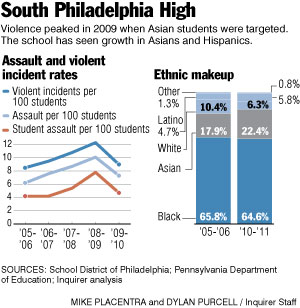For years, there have been stories in New York and Philadelphia newspapers about black kids beating up Asian classmates. But do not expect anybody to do anything that is likely to put a stop to it.But there was a huge fuss in Philadelphia. It was on the cover of Philadelphia Weekly, and when a mini-riot happened at South High, it resulted in weeks of media coverage—I covered a couple of the protests myself—and a change in the school's administration. That led to the Philadelphia Inquirer's huge week of stories this spring about violence in Philly schools more broadly. If Sowell wants to suggest that Arlene Ackerman's administration hasn't done enough to solve the problem, I'll join him. But he suggests that "the media, the politicians, the churches, and civic groups" are ignoring it—and ignoring it because we're afraid of saying bad thing about black kids. But he's wrong.
If these were white kids beating up Hispanic kids, cries of outrage would ring out across the land from the media, the politicians, the churches, and civic groups. But it is not politically correct to make a fuss when black kids beat up Asian kids.
So what happened at South High, anyway? It looks like things are getting better, but it's taking real effort.
And for what it's worth, that effort doesn't involve booting the bullies post haste. Instead, it involves taking steps to keep students safe in the moment and creating a better atmosphere at the school:
The doors of student bathrooms are kept propped open - a screen blocks direct sight inside - but staff can hear if trouble starts.As the story indicates, the new principal is willing to get rid of students who make problems—but he's also more focused on stopping violence before it starts. A carrot-and-stick approach seems to be more effective—and proven—than Sowell's stick-first approach.
Hackney also changed how Southern handles complaints of harassment and assault, which Asian students say were often not taken seriously. Now, students can write incident reports in their first language, crucial for those learning English.
Something else is different too: There's no trash on the floor. Staffers still bend over to pick up the occasional wrapper, but last year the litter seemed ankle-deep.
I'm happy to criticize the district for what it has failed to do. Honesty compels acknowledgement of where things are going right. But Sowell doesn't even bother to check the facts. He's got his headlines and his assumptions, and nothing else seems to matter.

No comments:
Post a Comment